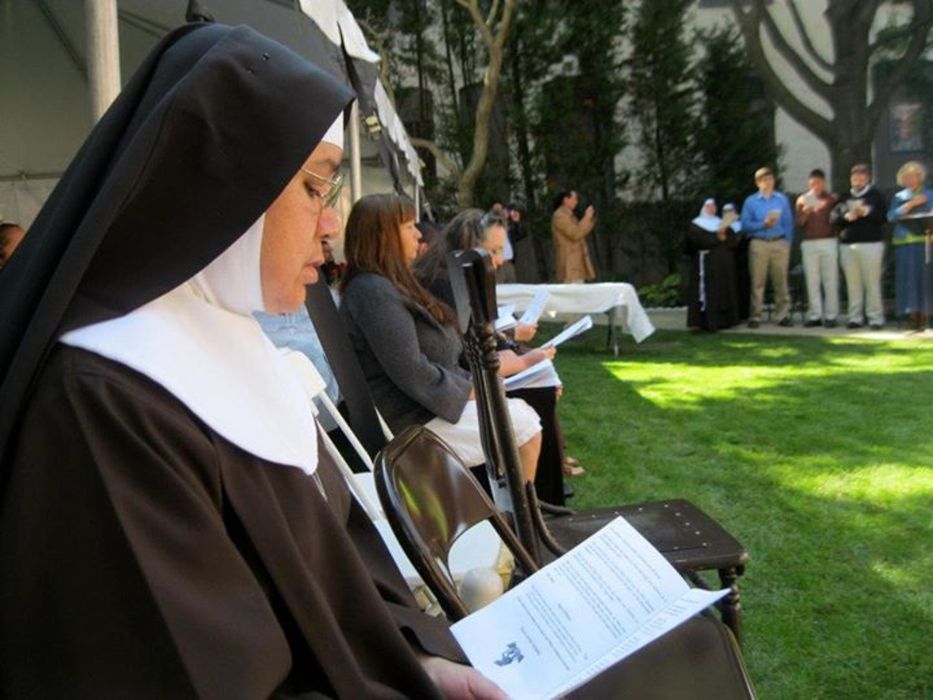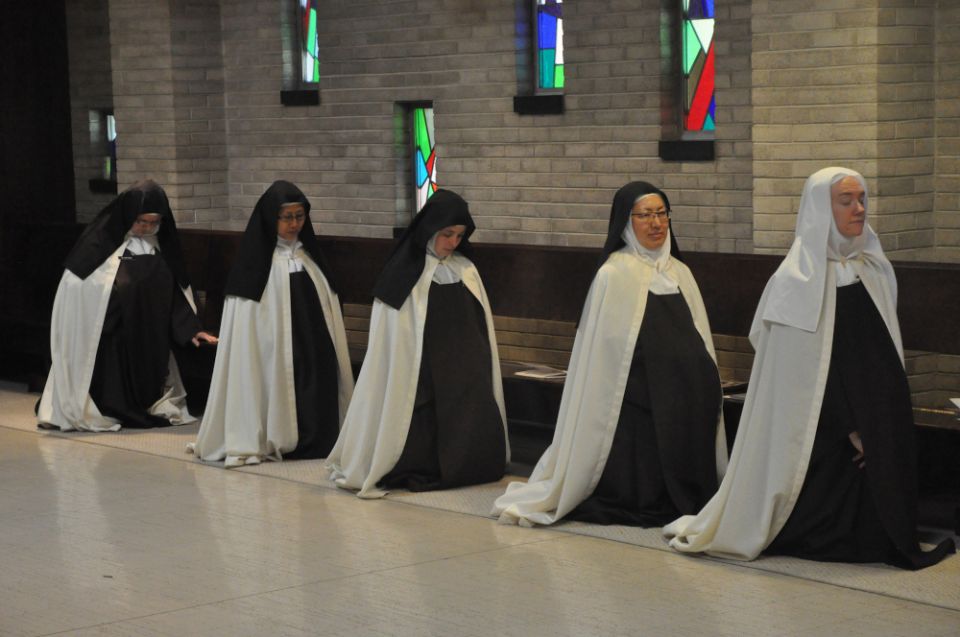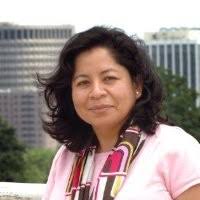
Capuchin Franciscan Sister Maria Elena Romero became a cloistered nun in 1983 when she joined the order of St. Clare. Though many are struggling with limiting contact with others as the world deals with COVID-19, this can be a spiritual opportunity, she said. (CNS/Rhina Guidos)
Take a quiet moment to consider how you're doing with the disruptions that the coronavirus is causing in your life. Alone, or with a family member, discuss:
- How is your overall state of mind?
- What concerns do you have about potential harm to your health or to a loved one?
- What opportunities are you missing out on? Are you feeling regret, resentment, or simple acceptance of how things are?
The changes we're forced to make are temporary inconveniences to protect ourselves and others. Many women religious choose to live in nearly total isolation from the world in order to pray for the needs of the world. What can you learn from them?
In the time of COVID-19, the cloistered life offers lessons for the world
by Rhina Guidos, Catholic News Service
WASHINGTON — People often telephone Sr. Maria Elena Romero, a Capuchin Franciscan Poor Clare sister in Wilmington, Delaware, to ask for her to pray for a personal intention, to sound out a problem, sometimes just to cry.
But lately, she's received calls with a different kind of problem: boredom.
As people around the world are asked to work from home, limit their contact with others and introduce "social distancing" into their vocabulary and lives, the sheltering in place that authorities are asking people to observe is causing some to go stir crazy.
But for Romero, limiting contact with the world is a part of life she observes as a cloistered nun. That means that like the other dozen or so sisters who live in her Capuchin Franciscan community, she only leaves the confines of the Veronica Giuliani monastery for limited reasons, such as a doctor's appointment.
When it comes to limiting contact with the outside world, she's kind of an expert.
Her advice for those struggling with the current reality of staying in place? First, make a schedule, she said.
"If you're idle, of course you're going to get bored," she said in a March 16 telephone interview.
The day at the monastery begins at 5 a.m. when the sisters make their beds, get dressed, then head to the chapel for prayer. Though most may not want to get up at this hour, it's a good idea to set a regular time to get up, start the day with prayer, give thanks, then organize work that needs to be done, she said.
Some would be surprised, but life inside a monastery is pretty packed with activity. Though the day revolves around a scheduled set of prayers, there are clothes and dishes to be washed, meals for 12 to prepare, finances to manage, food and supplies to order or buy. Each sister is assigned a chore.
Likewise, at home, she said, make a list of chores or responsibilities that need to be accomplished that day and dole them out: whether it's working from home, doing homework, or cleaning or fixing things. For those who don't have other responsibilities, assign a productive chore to stay busy until lunchtime.
A family member can be assigned to prepare lunch for others, or each person can take up a different task: setting the table, loading the dishwasher or helping the cook by cleaning the food preparation area.
People often complain that they don't have enough time for family. Lunch as family, a rare occasion for many, can be a great opportunity to catch up with how family members are dealing with confinement, to see how others are feeling and whether they can help others cope.
After lunch, families, much like the nuns at the monastery, can help wash the dishes as a group and put things away. The time after lunch can be used to rest, read or check in with friends or co-workers by phone, she said.
Romero said she has suggested to those who are bored to be creative about prayer. If the home has a patio or a yard, use the afternoon or lunch hour to eat outside, listen to relaxing music, pray or meditate, she said.

Discalced Carmelite Sisters Mary Grace Melchior, Marianna So, Marie Cecile Franer, Susanna Choi and Christine Rosencrans kneel at the Carmelite Monastery of St. Joseph in Terre Haute, Ind., during an Oct. 10, 2015, Mass. Though many are struggling with limiting contact with others as the world deals with COVID-19, this can be a spiritual opportunity, a cloistered sister said. (CNS/The Criterion/Sean Gallagher)
"Changing your setting always helps," she said, "find a place to be alone and that always helps to clear your head."
If that's a struggle, internet sites such as YouTube offer many learning opportunities, including instruction on how to pray the rosary, she said.
A lot of people tell Romero how they never learned specific prayers or to pray the rosary, so "I tell them this is your opportunity," she said. Time also can be used for self-reflection, to ask oneself whether they've wronged others and to seek forgiveness, to examine fears or to make a plan of how to help someone else who might be struggling – even if it's just through a phone call, she said.
After a bit of rest, prayer or meditation, return to work or chores, Romero said.
The time before dinner for the sisters includes a longer period of prayer, sometimes accompanied by reading as a community, then meditation that ends with prayer. After cleaning up the dinner dishes, sisters have social time or recreation time. For the Poor Clares, this can be a time to build community — an important aspect for any group that lives together.
Families can follow the sisters' example. They can cook and clean up together, have a longer time to interact and check in, play cards or board games, take part in physical activity together, watch a movie or read. A family or a person can use the time to learn a new skill, call a friend or a person who might be lonely or family members they haven't contacted in a while, or assess whether they can help the community and plan ways to do that.
As the day ends, the sisters gather together to pray as a community, giving thanks to God and asking for a good night's rest.
Though it's good to keep informed, Romero suggested that people carve out quiet time before bed, listen to music, pray or meditate – whatever it takes to get beyond the uncertainty, she said.
She suggested that people take themselves mentally out of the "coronavirus environment," especially if it's causing anxiety.
"Light a candle and meditate," she said. "This is a great time to ask for forgiveness, to look inside the self and cleanse the soul."
Many have complained to her in the past that they never have time, "but here it is," she said.
"This can be a time for blessings," she said. "But you have to take advantage of it, to see the good side of it, and then it can be a blessed time, a time to ask for mercy, to give thanks, to think about others, to reflect."
And if nothing else, then "just ask God for mercy," she said, "but it's Lent. We're in a time of reflection. Ask God for those things that only heaven can provide us."
Alone, or with a family member, discuss:
- Which of the suggestions that Sr. Maria Elena Romero makes (such as making a schedule, learning a new prayer or developing a new skill) seems most doable for you?
- Which practice would be the biggest stretch for you? Why?
- What would be the best thing about living a cloistered life? The most challenging thing?
"But when you pray, go to your inner room, close the door, and pray to your Father in secret. And your Father who sees in secret will repay you."
Jesus shared this guidance in a different context, telling us not to be showy about the ways we worship God. Right now, we shouldn't be going out in public to begin with, much less making a big deal about our prayer.
If you can, find a quiet place where you can be alone. Then consider:
- Why does Jesus tell us to pull away from the world to pray?
- What do you spend more time doing these days – praying or worrying? Why?
- What do you miss most about the Mass and other times we pray with others?
Sr. Maria Elena recommends meditation as a way to stay spiritually strong in stressful times. The church calls meditation a path to "composure of heart," so it's good to have this prayer method to help us stay calm and in control. Here is what the church says about meditation:
"Meditation is above all a quest. the mind seeks to understand the why and how of the Christian life, in order to adhere and respond to what the Lord is asking. The required attentiveness is difficult to sustain. We are usually helped by books, and Christians do not want for them: the Sacred Scriptures, particularly the Gospels, holy icons, liturgical texts of the day or season, writings of the spiritual fathers, works of spirituality, the great book of creation, and that of history the page on which the 'today' of God is written."
Catechism of the Catholic Church (2705)
Alone or with a partner, consider:
- Have you spent time in meditation, perhaps focusing on scripture or an image to help you know God better? If so, how has this strengthened you? What about meditation is challenging?
- Read one of the following verses and meditate on the hope it offers to deal with these uncertain times:
- After a devastating flood, God makes a promise to Noah (Genesis 9:11-15)
- Moses sings praise after God rescues the chosen people from their captivity (Exodus 15:1-18)
- Widowed and living in a time of famine, Ruth chooses to trust in God (Ruth 1:15-18)
- Paul and Silas, in prison, sing and pray to God and are freed (Acts 16:25-34)
- Paul shares God's message, "Do not be afraid," to encourage his fearful shipmates (Acts 27:21-25)
● What can history teach us about God’s care for us?
Sr. Maria Elena lives in the St. Veronica Giuliani Monastery in Wilmington, Delaware. Learn more here about the Poor Clares’ way of life, the vows they take and how to join in their mission.
As mentioned above, the Catechism encourages us to reflect on "history the page on which the 'today' of God is written." Who will write the history that we're living?
Why not you?
Journaling is a great spiritual practice. The moments of these days – the monotony of isolation, the dire news reports, the unexpected funny quirks, the use of technology to overcome barriers, the frustration over sports and proms and other events missed – can become a powerful story if you record them. Framing these in prayer, trying to find God in all things, makes your story even more incredible.
If you’re not a writer, consider a video diary. Or capture your social media posts and weave them together with prayer and comments. However you create it, the story of your life during the time of coronavirus can help you keep perspective now and could become a priceless history. For more encouragement, listen to this program about the deadly global flu pandemic in the early 20th Century and the lessons to be learned from people's personal writings.
Lord, be with us
in our inner room.
Give us hope
and help us cope
when everything seems too strange.
Give order and purpose to our days
and help us find blessings
in every sunrise to come.
Amen.
Tell us what you think about this resource, or give us ideas for other resources you'd like to see, by contacting us at education@globalsistersreport.org
